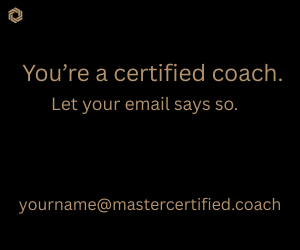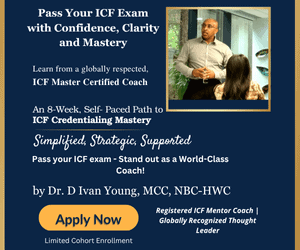As a coach, you are likely familiar with the concept of thought leadership, but have you ever considered how you can demonstrate thought leadership as a coach within the industry? Becoming a thought leader takes time, commitment, and an eagerness to impact a particular industry, but the benefits are well worth the effort.
A thought leader is more than an expert in their field and offers their insights broadly to their industry as a resource through media engagement, event presentations, and other channels. In doing so, they build their reputation while informing conversations about key topics within their industry, creating a win-win that can advance their careers while also giving back.
While the prospect of taking on the role of a thought leader may seem daunting, many coaches possess expertise in their respective industries or areas of focus that qualify them for such a role. Here are some ways to get started.
Be Clear on Your Message
Many may be able to claim years of experience within an industry, but the most compelling thought leaders have not only expertise but also a clear message that offers an insightful perspective. What is the focus of your coaching practice? Why would someone in your industry or region select you over another coach? You likely already have ideas about your perspective from your coaching brand, mission statement, or competitive differentiators. Use these ideas to help focus your efforts and provide consistent, insightful commentary that stands out.
Stay Informed About Trending Topics in Your Industry
As a thought leader, staying informed about trending topics in your industry allows you to maintain relevance and credibility. As your depth of understanding grows, you will start to anticipate shifts in trends and develop valuable insights that speak to the top issues of your industry. By actively participating in industry conversations and staying up-to-date on emerging trends, you develop the context to speak to your industry with confidence, authority, and original perspectives.
Offer Yourself as a Resource to the Media
Once you feel confident in the expertise and perspectives you can bring to your industry’s trending topics and most prominent issues, you can begin to offer those ideas to journalists, either as an expert source on a topic in general for future stories or to pitch a specific article idea for an interview or byline.
Before contacting a reporter, research the types of stories they cover to ensure alignment between your coaching business specialization and their interests. This alignment might be an industry you specialize in or a different focus, such as c-suite leadership, mothers with professional careers, or hybrid teams.
Once you have identified a reporter that aligns with your needs and interests, engage with the reporter by sending a short and friendly message offering your expertise or article idea for future coverage. You may not receive a response every time, but by exercising patience and persistence, reporters are more likely to recognize you in the future when you contact them. Similarly, you can pitch yourself as a speaker on those topics for events in your field.
Share Industry Insights With Your Network
You do not have to wait for a third party, such as a media outlet, to engage with you to start acting like a thought leader. You can also demonstrate thought leadership by sharing your insights about your industry through social media, your blog, an email newsletter, or other online channels.
This might include sharing an article from the industry media you have been following closely with your own thoughts added in your post, joining ongoing industry conversations to share your perspectives through hashtags or groups, or replying to a journalist to let them know how much you enjoyed their article on a topic of interest.
Whether you’re participating in online discussions, connecting with coaches and clients, or sharing insights, staying active within the coaching community strengthens your reputation as a thought leader.
Thought Leadership Advances Your Practice and Coaching Awareness
Thought leadership isn’t just about sharing knowledge but shaping discussions and informing the broader industry. As a coach, you are already well-equipped to offer insight and engage in meaningful conversations. As you bring this expertise to your thought leadership, you will not only elevate your reputation as a coach and make more potential clients aware of all you have to offer but also bring great value to your industry community and raise awareness of the power of coaching.
Disclaimer
The views and opinions expressed in guest posts featured on this blog are those of the author and do not necessarily reflect the opinions and views of the International Coach Federation (ICF). The publication of a guest post on the ICF Blog does not equate to an ICF endorsement or guarantee of the products or services provided by the author.
Additionally, for the purpose of full disclosure and as a disclaimer of liability, this content was possibly generated using the assistance of an AI program. Its contents, either in whole or in part, have been reviewed and revised by a human. Nevertheless, the reader/user is responsible for verifying the information presented and should not rely upon this article or post as providing any specific professional advice or counsel. Its contents are provided “as is,” and ICF makes no representations or warranties as to its accuracy or completeness and to the fullest extent permitted by applicable law specifically disclaims any and all liability for any damages or injuries resulting from use of or reliance thereupon.
Authors
Post Type
Blog
Audience Type
Experienced Coaches, External Coaches, ICF Chapter Leaders, Internal Coaches, Mentor Coaches, New Coaches, Professional Coaches, Team and Group Coaches
Topic
Building a Successful Coaching Business, Business Development
Related Posts
The Executive Coaching Blueprint: Positioning, Pricing, and Performance
Transitioning from corporate to coach can feel like uncharted territory for many…
Why Coaches Need Other Coaches
Setting the Foundation When you’re learning about the field of coaching while…
Expanding Coaching Possibilities With the Coaching Spectrum Framework™
When I discovered coaching 14 years into my career as an occupational…








